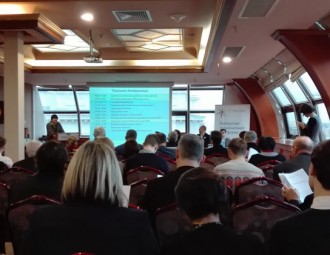How the post-election period will influence Belarus-European Union Relations

"Belarus in the post-electoral phase: expectations and plans" was the topic of the Belarusian National Platform conference, which took place on Saturday, 22 October.
According to Sviatlana Karaliova, the head of the Coordinating Committee of the Belarusian National Platform this time the Belarusian National Platform of the Eastern Partnership Civil Society Forum was attended by about 50 representatives of various non-governmental organizations.
The conference opened with a panel discussion on the main topic of the conference itself. As was explained by the moderator of the discussion Ulad Vialichka, the co-chair of the Eastern Partnership Civil Society Forum, Director General of the International Consortium "EuroBelarus", the elections to House of Representatives are a starting point of a kind of a new stage in relations with the European Union. Therefore BNP participants need to understand what to expect from this stage, what can change in the post-election period. Valeria Kostiugova, political analyst, representative of expert community “Nashe Mnenie”, Tatsiana Pashevalava, executive supervisor of "EuroBelarus and Yauheni Preiherman, director of research in the “Liberal club” were invited to participate in the panel discussion.

Yauheni Preiherman believes that it is very important that the elections did not become a step back. Belarusian-European relations are slowly but steadily developing. "Generally, we are approaching the resolution of contextual issues, such as visa facilitation and signing the partnership and cooperation agreement with EU", - stated Yauheni Preiherman. He reminded that Belarus is the only country in the region which does not have this agreement. Cooperation between Minsk and Brussels is currently governed with a treaty signed in 1989 by the USSR and the European Economic Community. Yauheni Preiherman adheres to the opinion that the Partnership and Cooperation Agreement with the EU can be signed "within next year."
In her turn, Valeria Kostiugova suggested that there will be no formal recognition of past Belarussian elections by the EU, but some positive changes will take place. Moreover the participation of Belarus in Euronest Parliamentary Assembly, according to Valeria Kostiugova, may become a subject of bargaining, "although it is not the most likely scenario".

At the same time, Yauheni Preiherman argues that inviting Belarus to Euronest would be an important step for Belarus-European Union cooperation.
The idea of Euronest becoming a big advantage for settling the issues was supported by Ulad Vialichka as well. However, he did not rule out the possibility that such a move could trigger a sharp reaction from Belarusian political forces. At the same time the Director General of "EuroBelarus"asked a rhetorical question: what is the difference between, say, the Azerbaijani Parliament included in Euronest and the Belarusian Parliament?
"This moment is working in our favor. But I have no clear guidelines on this issue ", - Ulad Vialichka commented.
Tatsiana Pashevalava spoke on the prospects of development of Belarusian-European relations for the Third Sector. She reminded that in the past such countries as Germany provided predominantly technical support to Belarus and such states as Sweden primarily helped civil society structures. Now this imbalance is leveled and the budget allocated for these purposes is not decreasing but increasing. At the same time, the donors insist on greater transparency of financial processes for the state. In other words, the representatives of non-governmental organizations will have to engage in a dialogue with the authorities.

In general, according to the panelists such a tool as a dialogue will be more and more used in the near future both in internal relations with the representatives of state bodies and in external relations with EU representatives.
Yauheni Preiherman’s opinion is that through an open dialogue NGO can win by means of their specialization, occupying thematic niche. "Specialization could allow them to take a seat at the negotiating table," - says "Liberal Club" leader. But he underlines that to achieve essential results first of all we need assertiveness and persistence.
During the conference it is also planned to elect a new Coordinating Committee, to adopt amendments to the regulations, to discuss the participating organizations contribution to the national platform and the registration form of BNP.
-
03.01
-
07.10
-
22.09
-
17.08
-
12.08
-
30.09



























